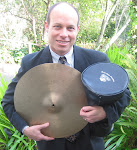 |
Sonja Lyubomirsky, Ph.D. |
The relationship between age and happiness is complex. Studies have found that older people generally tend to be happier than younger ones. A 22-year study of healthy veterans revealed that well-being increased over the course of these men’s lives, peaked at age 65, and did not start significantly declining until age 75. People tend to move toward more positive trait profiles as they age, becoming lower in neuroticism [negative emotions such as hate, anger, and jealousy--MS], for example, as they approach middle age. This may be because older people are better able to resist social pressures and pursue goals for more self-endorsed reasons, the result of a normative maturational process. Older people have also been found to be emotionally wiser.The Economist looks at the data differently, showing that well-being (a slightly different descriptor and dependent variable than happiness) follows a U-shape pattern.
 |
| The U-Bend |
The Economist notes the U-bend's
effect on happiness is significant—about half as much, from the nadir of middle age to the elderly peak, as that of unemployment. It appears all over the world. David Blanchflower, professor of economics at Dartmouth College, and Mr Oswald looked at the figures for 72 countries. The nadir varies among countries—Ukrainians, at the top of the range, are at their most miserable at 62, and Swiss, at the bottom, at 35—but in the great majority of countries people are at their unhappiest in their 40s and early 50s. The global average is 46. The U-bend shows up in studies not just of global well-being but also of hedonic or emotional well-being. One paper, published this year by Arthur Stone, Joseph Schwartz and Joan Broderick of Stony Brook University, and Angus Deaton of Princeton, breaks well-being down into positive and negative feelings and looks at how the experience of those emotions varies through life. Enjoyment and happiness dip in middle age, then pick up; stress rises during the early 20s, then falls sharply; worry peaks in middle age, and falls sharply thereafter; anger declines throughout life; sadness rises slightly in middle age, and falls thereafter. Turn the question upside down, and the pattern still appears. When the British Labour Force Survey asks people whether they are depressed, the U-bend becomes an arc, peaking at 46.
Speculations
So why do we see the U-bend? The Economist rules out external factors such as caring for teenage children and wealth effects and argues that internal factors must be at work. Aware of their own approaching death and more accepting of their failings, older people are more emotionally stable and less prone to quarreling, but I find this explanation wanting. It should lead to an upward curve from youth and not the U-bend.Perhaps a psychological mechanism is at work. Those in the prime of life, childbearing years, are blessed with the most energy, ambition, and libido, all of which wane by the late 40s and early 50s. At this age one is at the peak of his career, the last hurrah, but can see his powers starting to wane. It's too early to accept one's lot without resentment and sadness about what might have been and since it's all downhill from here, one worries about the future. Ironically, ten years later one sees less to fret about, and well-being rises.
Alternatively, a biological and Darwinian mechanism may increase feel-good neurotransmitters such as dopamine by the early 50s and beyond, perhaps to ensure better grand-parenting and tribal leadership.




No comments:
Post a Comment